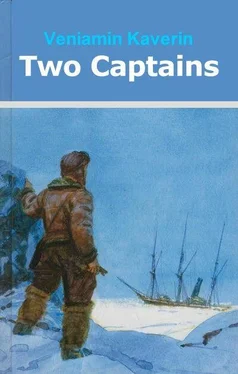The doctor disappeared, then reappeared with a hot kettle, and though he couldn't stop the speed with which the world was whirling around us, he did make us sit down side by side on the sofa, and treated us to some tooth-breaking hardtack. Then he fetched a billy-can of condensed milk and set it on the table, apologising for the tableware.
Then he went away. I did not detain him this time, and we were left alone in that cold house, with its kitchen cluttered with empty tins and dirty dishes, its hallway covered with snow that did not melt. Why were we in this house, through the windows of which we could see the rolling hills and the slack water moving importantly between the steep, snowy shores? But this was yet another "why?" to which I did not bother to seek an answer.
On going out the doctor had handed me some electric gadget. I immediately forgot about it and remembered it only when, laughing at something, I saw dense steam billowing from my mouth and melting slowly in the air, like from a horse standing out in the frost. The gadget was an electric fire, obviously of local workmanship, but a very good one. The room quickly got warm. Katya wanted to tidy up, but I did not let her. I gazed at her. I held her hands in a tight grip, as though fearing that she might disappear as suddenly as she had appeared.
On my way to the doctor's I had noticed that the weather was changing, and now, when I left the house-because it was already a quarter to ten-the cold, humming wind had dropped, the air was no longer limpid, and soft snow fell heavily and quickly-all signs of coming snowstorm.
To my surprise, they already knew at HO that Katya had arrived. The commander knew it, too-why else should he have greeted me with a smile? Very briefly I told him how we had sunk the raider. He did not ask me any questions, merely said that I was to give a report about it before the War Council that evening. What he was interested in was the St. Maria expedition.
I began in a restrained, rather embarrassed manner-though the fact that the expedition had been found during the performance of a combat mission would not have struck anyone who knew the story of my life as being odd. How was I to convey this idea to the fleet commander in a few words? But he was listening with such rapt attention, with such sincere, young interest, that I finally dismissed the thought of "a few words" and began telling my story simply- and quite unexpectedly, the effect was an authentic account of what really happened.
We parted at last, and then only because the admiral bethought himself of Katya.
I don't know how much time I spent with him-it must have been no more than an hour-but when I came out I did not find Polarnoye. It was hidden in a pall of whirling, blinding, whistling snow.
Luckily I was wearing burki (*Burki-high felt boots.-Tr.) -even so I had to turn the tops back above my knees. Talk about terraces-there wasn't a trace of them! Only a fantastic imagination could picture houses somewhere behind those black clouds of whipped snow, and in one of those houses, in Row 5, Katya laying the hardtack out on the electric fire to warm them, as I had advised her. In the end I got to the house, of course. The hardest thing was to recognise it. In little more than an hour it had turned into a fairy-tale dwarfie hut, standing lopsided and snowed up to the windows. Like a god of snowstorm I burst into the hall, and Katya had to brush me down with a whisk broom, starting from the shoulders, which were caked with frozen snow.
We had talked everything over, it seemed; twice we had approached the subject of the Captain's letters of farewell-I had brought them with me to Polarnoye to show to the doctor; the rest of the material relating to the expedition I had left at my regiment. But we
avoided the subject of these letters and everything associated with them, as though we felt that in the joy of our reunion the time had not yet come for us to talk about them.
Katya had already told me all about little Pyotr-what a swarthy little chap he was, the very image of my poor sister. We had already discussed what to do about Grandma, who had quarrelled with Farm Manager Perishkin and rented a "private apartment" in the village. I had already learnt that Pyotr Senior had been wounded a second time, had received a decoration and returned to the front-in Moscow Katya had chanced to meet the commander of his battalion, a Hero of the Soviet Union, who had told her that Pyotr "didn't give a damn for death", a phrase which had startled Katya. I had learnt about Varya Trofimova, too, and that if things worked out the way Katya thought they would "it would be the greatest ever happiness for both of them". Changes had been made in the room, too-things were arranged more comfortably, looking as if they were grateful to Katya for having brought warmth to this cold, masculine abode. Some five or six hours had passed since that wonderful, momentous change had taken place. The entire world of our family life, lost to us for so long-for eighteen desolate months-had come back at last, and I had not yet got used to the idea that Katya was with me once more.
"D'you know what I've been thinking most of the time? That I didn't love you enough and kept forgetting how hard you had it with me."
"And I was thinking how hard you had it with me," Katya said. "When you used to go away and I worried about you I was still happy, despite all those anxieties, cares and fears."
While we were talking she went on arranging things, as she always did in hotels, even in trains, wherever we went together. It was the habit of a woman accustomed to moving with her husband from place to place-and what a pity, tenderness and remorse I felt towards her for that pathetic habit.
God, how I had missed her! I had forgotten everything! Forgotten, for instance, how she did her hair for the night, plaiting it into pigtails. Her hair was still short, and the pigtails were comical little things. Yet she plaited them, uncovering her beautiful little ears-even these I had forgotten.
We talked on after a long silence, now in whispers and about quite another matter. This other matter was Romashov.
I remember having read somewhere about palimpsests, that is, ancient parchments from which later scribes erased the text to write bills and receipts on them, and years later scholars discovered the original writings, which sometimes belonged to the pen of poets of genius.
It was like a palimpsest, when Katya gave me Romashov's version of what had happened in the aspen wood, and I erased this lie as if with a rubber and beneath it the truth came through. I saw and explained to her this dirty trick of his, which he had used twice-first to prove to Katya that he had saved my life, then to show me that he had saved hers.
I related to her word for word our last conversation at his flat, and Katya was astonished at Romashov's confession, which explained the cause of all my failures and resolved the riddles which had always weighed upon her heart.
"Did you put it all down in writing?"
"Yes. I set it out like an examination record and made him sign it."
I repeated his account of how he had been watching my every step in life, tormented by envy, which has racked his mean, restless soul ever since his schooldays. I said nothing, however, about the magnificent portrait of Katya hanging over his desk. I said nothing because this love of his was an insult to her.
She listened to me with a sombre face, her eyes burning. She took my hand and pressed it hard to her bosom. She was pale with emotion. She hated Romashov twice or thrice as much perhaps for the very thing I did not want to talk about. As for me, he was remote and insignificant, and it was cheering to think that I had got the better of him.
My wife was asleep, her cheek pillowed on her hand. My clever, lovely wife, who, heavens knows why, had always loved me with this undying love. She was sleeping, and I could gaze my till at her, thinking that we were alone now and though this short, happy night would end all too soon, we had wrested it from the raging blizzard that was sweeping through the world.
Читать дальше












